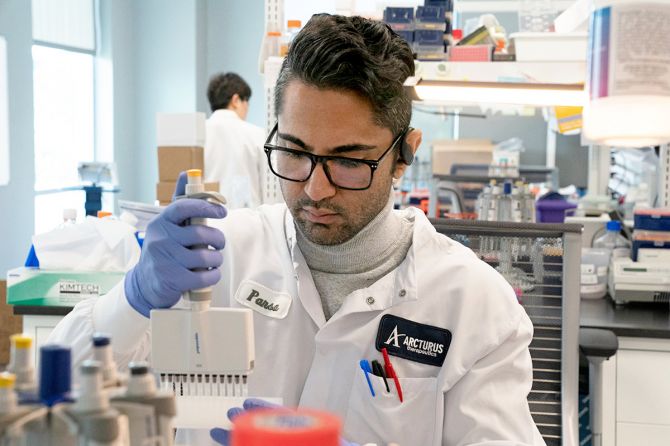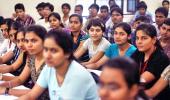rediffGURU Mayank Chandel coaches students for competitive exams like the IIT-Joint Entrance Exam, NEET-UG, SAT and Common Law Admission Test (CLAT).
- Mayank will answer your questions HERE.

Did you know that you can pursue a medical career without appearing for the National Eligibility cum Entrance Test (NEET)?
Similarly, you can pursue a career in engineering without appearing for the IIT-Joint Entrance Exam.
rediffGURU Mayank Chandel, founder of CareerStreets, has over 18 years of experience in coaching and training students for various exams like the IIT-Joint Entrance Exam, NEET-UG, SAT and the Common Law Admission Test (CLAT).
Besides coaching students for entrance exams, he also guides Class 10 and 12 students about career options in engineering, medicine and the vocational sciences.
Mayank holds an engineering degree in electronics from Nagpur University.
- You can ask your questions about entrance exams and careers in science and engineering to rediffGURU Mayank Chandel HERE.
Amit: Hi. My daughter is in Class XI science.
She has combination of PCB and target NEET Exam.
Can you suggest which other options that she can look for after 12?
Hello Amit. Here are some other career avenues that you can seek.
Below are some of the best options your daughter can pursue without NEET:
Bachelor of Medical Laboratory Technology (BMLT): This course is related to the diagnosis and treatment of diseases through the analysis of blood, tissue and other bodily fluids.
Bachelor of Optometry and Vision Science (BOVS): This course is related to the diagnosis and treatment of vision disorders, including the use of contact lenses, glasses and other corrective devices.
Bachelor of Respiratory Therapy (BRT): This course is related to the diagnosis and treatment of respiratory diseases, including the use of oxygen therapy and mechanical ventilation.
Bachelor of Nuclear Medicine Technology (BNMT): This course is related to the use of radioactive materials to diagnose and treat diseases, including cancer.
Bachelor of Neurophysiology Technology (BNT) - This course is related to the diagnosis and treatment of neurological disorders, including the operation of equipment such as EEG and EMG machines.
Bachelor of Perfusion Technology (BPT): This course is related to the use of heart-lung machines to support patients during cardiac surgery.
Bachelor of Medical Imaging Technology (BMIT): This course is related to the use of medical imaging technologies such as MRI, CT and X-ray machines to diagnose and treat diseases.
Bachelor of Renal Dialysis Technology (BRDT): This course is related to the use of dialysis machines to treat patients with kidney disease.
Forensic Science: You can opt for a career in forensic science by pursuing a BSc or MSc in forensic science.
Pharmacy: You can opt for a career in pharmacy by pursuing a BPharm or MPharm.
Anonymous: Sir/Maam, my daughter is doing 12th medical.
In case she does not get good NEET score, what alternatives can she pursue other than medical?
So far she is intent on medical but is lagging behind in Physics.
Hi, Here are a few options that you can do with biology:
- Biotechnology
- Environmental science
- Microbiology
- Forensics
Anonymous: I have two-year gap between 10 and 12th. I will give IIT paper, is that a problem? Can I take admission in IIT colleges?
Hi, you can appear for JEE Main and then JEE Advanced, the criteria being candidates should have been born on or after October 1, 1998.
Five years age relaxation is given to SC, ST and PwD (person with disabilities) candidates, ie these candidates should have been born on or after October 1, 1993.
Pramodh: My son is completing his 12th grade (IB Curriculum). He has taken Maths, physics and computer science as his core courses. He did not take chemistry.
He has completed SAT as well.
He wants to pursue computer science in BE/BTech/BS (four year course). Colleges are asking for chemistry.
Can you suggest any colleges in India where chemistry is not needed and he can pursue his computer science in BE/BTech/BS? Thanks!!
Sir, in India, competitive exams are a part of the college admission process.
In this competitive exam, they test PCM (physics, chemistry, maths) and they want PCM to be taken at the board level.
Still, I would suggest that you enquire in private universities like Manipal, etc.
Javed: Hi Sir, my child is currently in Xth. She wants to pursue career in medical research.
Kindly advise career options after X/XII for successful future.
Hello Javed, if your child wants to pursue career in medical research field then you will have to follow the path as below.
Pursue a bachelor's degree in a relevant field such as biology, chemistry, biochemistry, biomedical science or a related discipline.
Look for opportunities to gain research experience as an undergraduate student. Many universities offer research assistant positions or internships in labs.
Participate in science-related clubs, conferences and seminars to expand your knowledge and network with professionals in the field.
Pursue a master's degree (MSc) and doctor of philosophy (PhD) in a specific area of medical research such as molecular biology, pharmacology, genetics, epidemiology or neuroscience.
Identify your specific area of interest within medical research as this will determine your future career path. For example, you could focus on cancer research, infectious diseases, neuroscience, genetics or drug development.
Seek out internships or research fellowships at reputable research institutions, universities or pharmaceutical companies. These opportunities provide hands-on experience and connections in the field.
As you progress in your education and career, aim to publish your research findings in peer-reviewed journals. This will establish your credibility and expertise in your chosen field.
Career options include:
Research Scientist: Conduct research, design experiments and analyse data in academic or industry settings.
Clinical Research Coordinator: Oversee clinical trials and research projects in healthcare settings.
Medical Writer: Create research papers, grant proposals and technical documents.
Biostatistician: Analyse and interpret data in medical and healthcare research.
Epidemiologist: Study the patterns and causes of diseases in populations.
Pharmaceutical Researcher: Work for pharmaceutical companies to develop new drugs and therapies.
Academic Researcher/Professor: Teach and conduct research at universities or research institutions.
- You can post your questions for rediffGURU Mayank Chandel HERE.
Please Note: The questions and answers in this advisory are published to help the individual asking the question as well the large number of readers who read the same.
While we value our readers' requests for privacy and avoid using their actual names along with the question whenever a request is made, we regret that no question will be answered personally on e-mail.
All content herein is written and published online for informational purposes only. It should not be relied on as your only source for advice.
If you choose to rely on any information provided herein, you do so solely at your own risk. Opinions expressed herein cannot necessarily provide advice to fit the exact specifics of the issues of the person requesting advice.
Similarly, information received via an external link embedded in an article cannot be relied on as your only source of advice.











